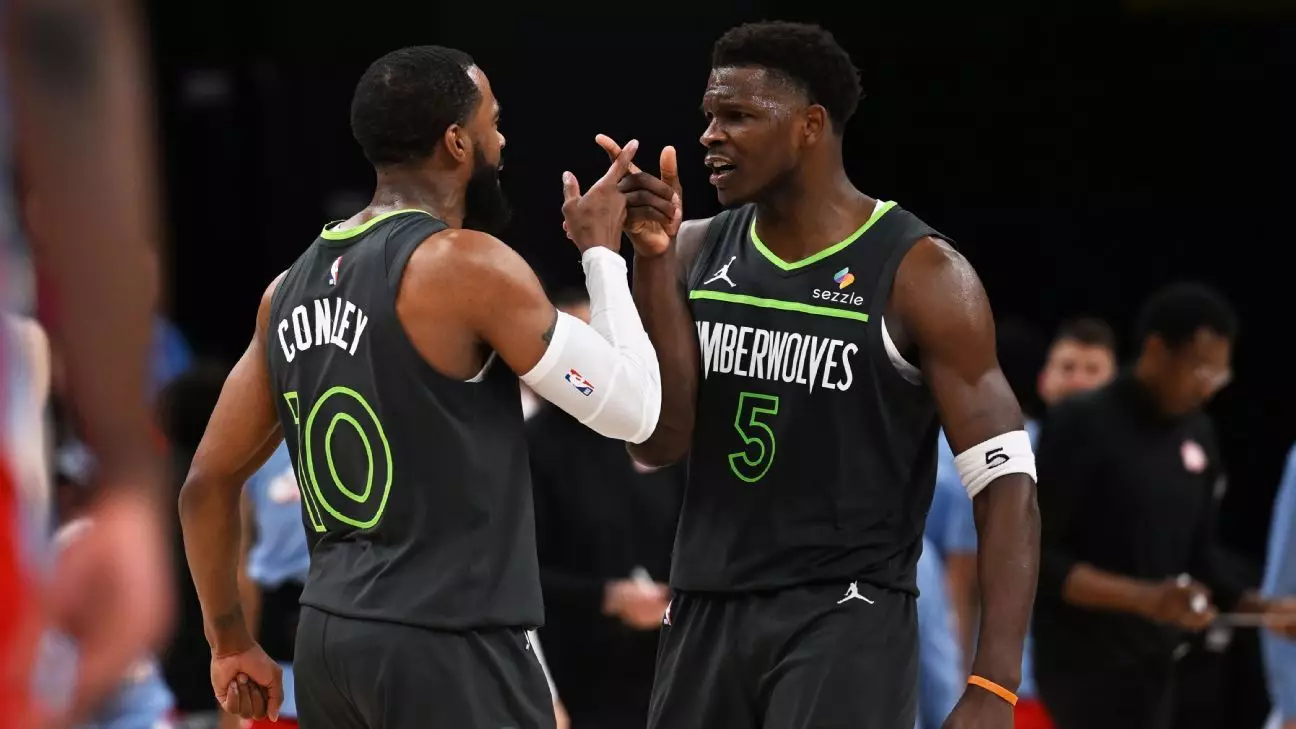In what could have been a catastrophic setback for the Minnesota Timberwolves, the NBA recently overturned a crucial technical foul issued to star player Anthony Edwards. The league’s decision came after the aggressive call during a commanding victory over the Brooklyn Nets, saving Edwards from a one-game suspension that would have barred him from participating in their final contest against the Utah Jazz. This instance has sparked conversations about officiating standards, the pressures of maintaining discipline in professional sports, and the continuous tug-of-war between athlete expression and game integrity.
The technical foul, Edwards’ 18th of the season—the most in the NBA—came at a crucial moment. With a complaint directed toward the referee regarding a call he found unjust, the foul seemingly exemplified the frustration many players feel when emotions run high on the court. While the NBA has established guidelines to mitigate excessive technicals through progressively stricter penalties, this incident raises fundamental concerns about the interpretation of player conduct and the boundaries of reasonable complaint.
A Complex Relationship with Officiating
Edwards’ fiery personality on the court is part of what makes him an impactful player, yet it also subjects him to the league’s disciplinary measures. The technical was assessed not only for the foul but for accompanying profanity, an act that the referee considered a breach of sportsmanship. However, in a humanistic view of the game, the expressions of frustration seem almost inevitable. After all, athletes expend a tremendous amount of energy during games and often find themselves operating under intense pressure and scrutiny. The real question then becomes: how do we find a balance between maintaining respect for officials while allowing players to express legitimate concern?
Edwards himself voiced his worries in a post-game interview, acknowledging his friendship with referee Ray Acosta but maintaining that the call was excessively punitive. His insistence on the technical being unwarranted reflects a larger narrative—players desire to engage in dialogue that they feel should be encouraged, rather than suppressed. The overwhelming tendency to view player interactions as potentially harmful could lead to a stifled dynamism in the sport.
The Timberwolves’ Playoff Aspirations
Intriguingly, the Timberwolves are standing at a pivotal juncture. They’re eyeing critical playoff positioning, needing this last game against the Jazz to solidify their place among the top seeds in the Western Conference. Success here could mean home-court advantage, a significant asset that could tilt the scales in their favor as they strive for postseason success.
The need for victory underscores an urgent sense of teamwork and strategy that transcends the contributions of any single player, even one as integral as Edwards. Yet one must reflect on how reliance on individual talent can often be at odds with the overarching goals of the team. The collective effort required from the entire roster to mitigate the impacts of a potential absence creates an intricate web of dependency that speaks volumes about the intricacies of team dynamics in high-stakes environments.
Beyond Discipline: A Call for Growth and Understanding
As the Timberwolves look to leverage their success, the incident with Edwards serves as a reminder of the nuanced relationship between players and the officials governing the league. Rather than fast-tracking punitive measures that might hinder player expression, perhaps the NBA should evaluate how to promote growth in player-official relationships. Efforts toward education, discussion, and mutual respect could foster a culture where athletes pacify their frustrations articulately rather than reducing them to technical fouls or personal grievances.
Ultimately, the NBA’s reversal of the technical indicates an understanding of the game’s emotional landscape. With heightened scrutiny surrounding sportsmanship and conduct, fostering an environment where genuine conversations among players and officials can flourish may pave the way towards an evolved era of basketball. The game can grow stronger through a holistic approach that values discipline yet honors the intensity of competition. Let us hope the Timberwolves carry this spirit of fair play into their playoff drive, transcending mere regulations to embody a dynamic, compassionate game.



Leave a Reply